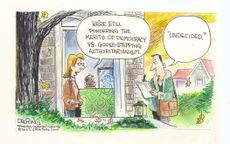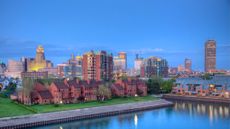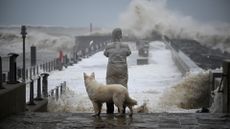How climate change is going to change the insurance industry
Some regions will soon be 'uninsurable'


As climate change brings about more extreme weather events, insurance companies are struggling to cover areas of growing risk. Over time, some regions may because highly unaffordable or even impossible to live in.
How is insurance coverage shifting?
Climate change has put more places at risk for natural disasters, creating greater risk for insurance companies. Because of this, homeowners are facing “increasing insurance prices and reduced coverage due to high climate risks,” reported CBS News. A new report by the First Street Foundation found that close to 40 million properties across the U.S. are at risk of rising insurance rates and non-renewals, making up approximately one-quarter of all homes in the country.
“Some places may be impacted very minimally, but other places could see massive increases in insurance premiums in the coming years,” Jeremy Porter, co-author of the report, told CBS News. Regions prone to wildfires, flooding and strong storms are more at risk. California, Florida, and Louisiana are some of the most affected regions however, the signs are beginning to show even in inland states like West Virginia.
Subscribe to The Week
Escape your echo chamber. Get the facts behind the news, plus analysis from multiple perspectives.

Sign up for The Week's Free Newsletters
From our morning news briefing to a weekly Good News Newsletter, get the best of The Week delivered directly to your inbox.
From our morning news briefing to a weekly Good News Newsletter, get the best of The Week delivered directly to your inbox.
Climate change “is a problem that is already here,” Todd Bevington, managing director at the insurance broker VIU by HUB, told The Associated Press. In his 30 years of doing insurance, he said “I’ve never seen the market turn this quickly or significantly.” In some cases, insurance policy price increases can be “absolutely crippling” with some even seeing 80% increases, First Street CEO Matthew Eby told CBS.
In other cases, homeowners are opting to forego insurance altogether as some regions become essentially “uninsurable,” according to the report. “Without the ability to insure properties in high-risk areas with relatively affordable policies, homeowners will not be able to afford the cost of ownership associated with homes in those areas,” and property values will deflate. On the flip side, other regions “may now also exist in an ‘insurance bubble,’ meaning that homes may be overvalued as insurance is underpricing the climate change-related risk in those regions,” per CBS.
Why is this happening?
It comes down to the fact that climate risk is becoming increasingly difficult to predict. “You can no longer rely on 100 years of wildfire data to price risk when the unprecedented has happened,” Lara Mowery, global head of distribution at reinsurance firm Guy Carpenter & Co., told AP. In turn, insurance companies have raised rates. “Mother Nature is busting through the front door of American families,” Roy Wright, CEO of the Institute for Business and Home Safety, told The Atlantic.
However, even high premiums are likely insufficient in accounting for the risk. “Major home insurers in some locations are concluding that no premium — or at least no premium that customers are willing to pay and state regulators are likely to permit — will cover the potential losses,” wrote The Atlantic.
Insurance rates due to climate change also play a significant role in the lack of affordable housing. Previously, regions with higher climate risks were largely less expensive to live in, however, considering insurance costs, their affordability has decreased, Forbes reported. “Local and state governments must prioritize building resilient housing in places with low disaster risks and insurance costs.”

Continue reading for free
We hope you're enjoying The Week's refreshingly open-minded journalism.
Subscribed to The Week? Register your account with the same email as your subscription.
Sign up to our 10 Things You Need to Know Today newsletter
A free daily digest of the biggest news stories of the day - and the best features from our website
Devika Rao has worked as a staff writer at The Week since 2022, covering science, the environment, climate and business. She previously worked as a policy associate for a nonprofit organization advocating for environmental action from a business perspective.
-
 'In Ukraine, sadly, promises are hard to keep'
'In Ukraine, sadly, promises are hard to keep'Instant Opinion Opinion, comment and editorials of the day
By Harold Maass, The Week US Published
-
 Today's political cartoons - December 1, 2023
Today's political cartoons - December 1, 2023Cartoons Friday's cartoons - the undecided voter, Kissinger's last stand, and more
By The Week US Published
-
 Quiz of The Week: 25 - 1 December
Quiz of The Week: 25 - 1 DecemberPuzzles and Quizzes Have you been paying attention to The Week's news?
By Harriet Marsden, The Week UK Published
-
 Places that will become climate refuges
Places that will become climate refugesThe Explainer The Midwest may become the new hotspot to move
By Devika Rao, The Week US Published
-
 A23a: why world's biggest iceberg is on the move
A23a: why world's biggest iceberg is on the moveThe Explainer The mass of ice is four times the size of New York and 'essentially' an island
By Chas Newkey-Burden, The Week UK Published
-
 Cop28: is UAE the right host for the climate summit?
Cop28: is UAE the right host for the climate summit?Today's Big Question Middle East nation is accused of 'pushing for a green world that can still have its oil'
By Chas Newkey-Burden, The Week UK Published
-
 Scientists have their eyes on 2 supervolcanoes
Scientists have their eyes on 2 supervolcanoesThe Explainer 'The probability of a catastrophic eruption is low but not nil'
By Devika Rao, The Week US Published
-
 Want to understand climate change? Look to the clouds.
Want to understand climate change? Look to the clouds.The Explainer Scientists are still uncovering the role clouds play in climate change
By Devika Rao, The Week US Published
-
 6 looming climate tipping points that imperil our planet
6 looming climate tipping points that imperil our planetThe Explainer A UN report details the thresholds we may be close to crossing
By Devika Rao, The Week US Published
-
 'Danger to life' warning as Storm Ciarán hits UK shores
'Danger to life' warning as Storm Ciarán hits UK shoresSpeed Read Schools closed and train, plane and car travel disrupted as Met Office issues weather warnings
By The Week UK Published
-
 The drying Amazon rainforest: a drought that affects the world
The drying Amazon rainforest: a drought that affects the worldUnder the radar The Amazon is suffering a drought of historic severity and it’s pushing its inhabitants to their limit
By The Week UK Published










